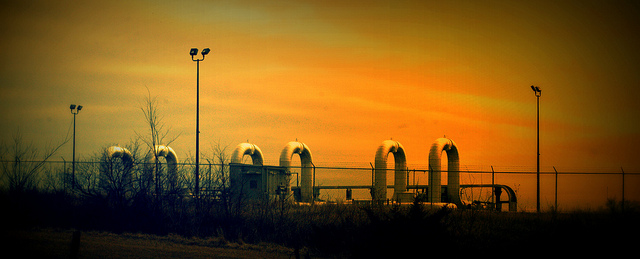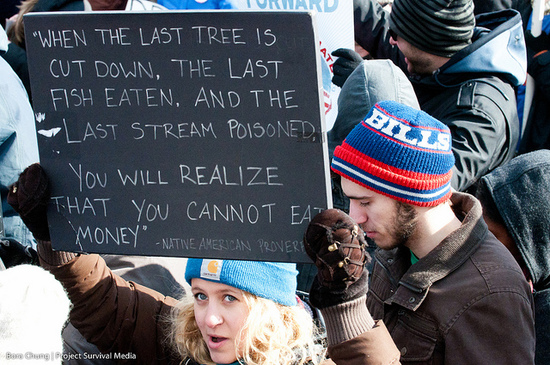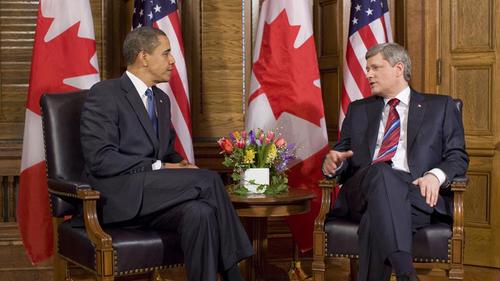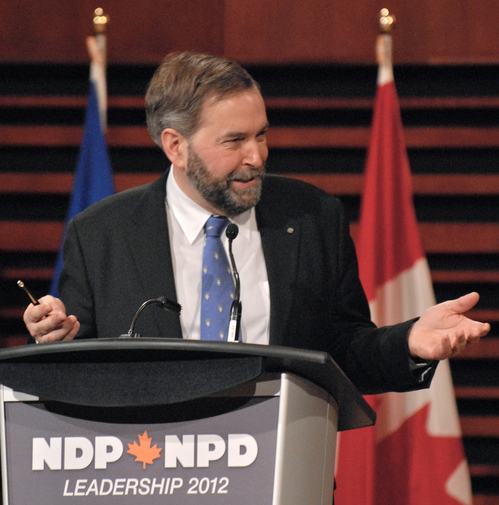
Image of Trans Canada Keystone Pipeline
By shannonpatrick17
Campaign season is upon us. Not that it ever truly stops, but Canadians can expect 2014 to brandish no shortage of finely tuned marketing mechanisms, rhetorically structured PR events and attack advertisements. Gradually, politicians assert that they are less concerned with polarizing topics and more concerned about answering what the public wants. Moving away from ideology is a step in the right direction. Indeed, our needs seem to be addressed, at least ostensibly. Still, in an increasingly nonpartisan oriented system, questions that once concerned the everyday citizen may be glossed over.
Even so, there are political issues that seem to be outplaying the rampant use of hortatory language and grandiloquence. The greatest example of this is the question of the environment and in particular the Keystone pipeline. How will the pipeline affect the economy and the environment? How will it affect my neighbors, myself, my children, my children's children? What's the fuss about and what is this Keystone pipeline anyway? Frankly, Canadians want answers and they want them before voting for the next PM. This article intends to help satiate these inquiries by providing the pros and cons of the pipeline and also where politicians stand in regards to the project.
PROS
A first point in favour of Keystone XL (KXL) is that a pipeline is the safest form of oil transportation. Other options including tanks, boat or rail are unfeasible, costly (economically and environmentally) and ultimately dangerous. A recent example of such was seen this summer when a train heading from Maine to Lac-Mégantic derailed and exploded, killing 47 people in the small town located in the Eastern Townships of rural Quebec [2]. On the other hand, some opposed to the pipeline suggest that the pipeline itself is vulnerable to terrorist attack. Still, this argument is riddled with conspiracy.
Another positive aspect of the keystone pipeline is that it will stimulate the economy. Prime Minister Steven Harper avidly supports the Keystone Pipeline, often conjoining it to the strengthening of the Canadian economy. The pipeline would provide between 442- 2200 Canadian jobs, $58-million in Canadian salaries, and an annual property tax of $6.5 million [3].
Furthermore, the controversial pipeline is argued to have a positive effect on the American economy. TransCanada claims that the pipeline will bring "42,100 direct, indirect and induced jobs and approximately $2 billion in earnings throughout the United States". Also, Major tax cuts will be issued to the affected regions and it would supply $3.4 billion to the U.S.' GDP [4].
It has become a split issue. Some suggest the environmental factors are being overplayed. As Russ CEO of TransCanada stated:
"Keystone XL is not about energy versus environment--it's simply about where Americans get their oil. Persian Gulf countries and Venezuela contribute three million barrels per day of imports. These countries are far less stable and more expensive sources of foreign oil than Canada, which is America's largest trading partner. "[5]
If not shipped to the US the fear is that it will be shipped to another oil-dependent country, such as China. This argument is based on the idea that Canada is not going to stop producing oil because it is economically impossible [6].
CONS
The strongest argument against the Keystone Pipeline is the devastating effect the pipeline would have on the environment. Particularly, if the project were to proceed, environmental mayhem would ensue.
 Image of Protestors against KXL
Image of Protestors against KXL
By 350.org
Though government officials were happy to focus on the positives of US Environmental Assessment, there were some undeniable facts. The keystone pipeline will devastate the environment. Amongst the report was the acknowledgement that groundwater, wetlands, fisheries, terrestrial vegetation, land use, air quality and noise control would be affected [7]. In addition to this is the sure the destruction of wildlife and habitat which, in the US alone, is predicted to affect 14 species that are endangered, threatened, or vulnerable.
For those opposed to the pipeline, using the economy as an excuse for proceeding with KXL is both absurd and mendacious. Oil production has indeed supported Canadians to date. Yet, the science is unanimous; overproduction of oil is detrimental, and is linked to the end of our planet. James Hansen, a NASA scientist strongly opposed to the building of the pipeline, believes that it will mean "game over" for our earth [8]. Hansen told a reporter from Solve ClimateNews that "President George W. Bush said that the U.S. was addicted to oil. So what will the U.S. response to this situation be? Will it entail phasing out fossil fuels and moving to clean energy or borrowing the dirtiest needle from a fellow addict? That is the question facing President Obama".
And who said that being green could not be economically beneficial anyways? To think otherwise would be to dwindle in a past that abuses a non-renewable resource. Can no jobs be created in the development of new viable sources of energy? The Harper government has been accused of silencing scientists, especially when coming out against the environmental impact that the Keystone project will have on the environment [9]. Information from the opposing side is being denied to Canadian media and its citizens. Even Justin Trudeau, despite supporting the Keystone project, believes just that and said that the Harper government has timelessly and falsely separated the issues of the environment and the economy [10].
Thoughts
Admittedly, it's difficult to believe that the government could have such disregard for the environment. TransCanada and politicians have indeed expressed that they are wary of environmental issues. It is clear that if the economy and the environment were to enter a boxing rink the government would gamble against the green team. The Premier of Alberta, Alison Redford, most recently expressed that she would not impose penalties to cut carbon emission if the US was not going to either [11]. Redford stated, "This isn't a game of chicken...[w]e're not going to start introducing anything that puts us at a competitive disadvantage when other jurisdictions aren't prepared to take any steps." The problem with this is that it is not just a game: it's the game of life. And thus far the Canadian environment is getting its butt kicked.
So where do you stand? If nothing else, knowing what your thoughts are on this particular issue, will help narrow down your decision come voting day.
WHERE DO OUR LEADERS STAND?
Image of President Barack Obama (left) and Steven Harper (right)
By Wikipedia
Conservative Party of Canada: Strongly FOR Keystone
Quote: Keystone project is a "no-brainer" (Steven Harper)
Image of Justin Tru
deau
by Wikipedia
Liberal Party of Canada: FOR Keystone
Quote: "My support for Keystone is steadfast" (Justin Trudeau)
Note: Though unexpected, this is a smart move for Trudeau given his audience of mish-mashed voters. Need to round up support in BC and not upset, Alberta. His biggest problem is Quebec, who sweepingly voted NDP into Parliament. Undecided voters, who would potentially vote for Trudeau but who are quite against the Keystone project. Quebec who remains environmentally perceptive whether it be destroying lands of Canada or yes, even, in the US.
Image of Thomas Mulcair
By Wikipedia
New Democratic Party: AGAINST Keystone
Quote: "Give priority to creation of jobs in Canada, to taking care of Canada's energy security and getting a better price." (Thomas Mulcair).
 Image of Elizabeth May
Image of Elizabeth May
By Wikipedia
Green Party: Strongly AGAINST.
Quote: "Projects like the Keystone Pipeline underscore the consequences of the unsustainable expansion of the Alberta oil sands. Green Party policy would be to freeze any further expansion of the oil sands." (Elizabeth May).
References
1. TransCanada
2. Gazette
5. Keystone XL
6. CNN
7. Keystone XL2
8. Reuters
9. CBC
10. PR Event at Concordia University on Feb. 6 2014
11. Financial Post



Leave a comment